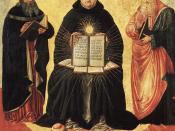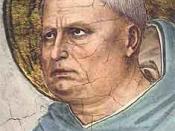Divine and Human Law As seen by St. Thomas AquinasSt. Thomas Aquinas was a very influential theologian and philosopher of the 13th century. In the 49 years of St. Thomas Aquinas' life he composed more than sixty works of various length. Not all of these were written by Aquinas himself. In fact, Aquinas is known to have dictated to several scribes at the same time. According to Brother Michael who appears to be quite educated on the subject of St. Thomas Aquinas and has a very interesting web page, "The Catechism of the Council of Trent, composed by disciples of the Angelic Doctor, is in reality a compendium of his theology, in convenient form for the use of parish priests."ÃÂ Maybe this statement is a little extreme, however the impact that Aquinas has had on theology is undeniable. Some of the areas of Aquinas' influence was in the development of the theories of metaphysics, cognition and law.
This paper will mostly limit itself to aspects concerning Divine and Human Law.
It is implicitly assumed that God prefers men to be happy as opposed to suffering needlessly. It requires little contemplation to realize that if the opposite was true God could only be seen as quite sadistic. Or if God was apathetic to our suffering He would be far removed from the Christian God that Aquinas and most Medieval people were familiar with. Both of these scenarios would require a change in paradigm so substantive it was perhaps considered unnecessary to argue them. Thus we start with the assumption that God's Will is in accordance with that which brings happiness to all people (i.e. the common good). From this can be derived that the aim of Divine Law is directed at the common good. This Divine Law is different...


